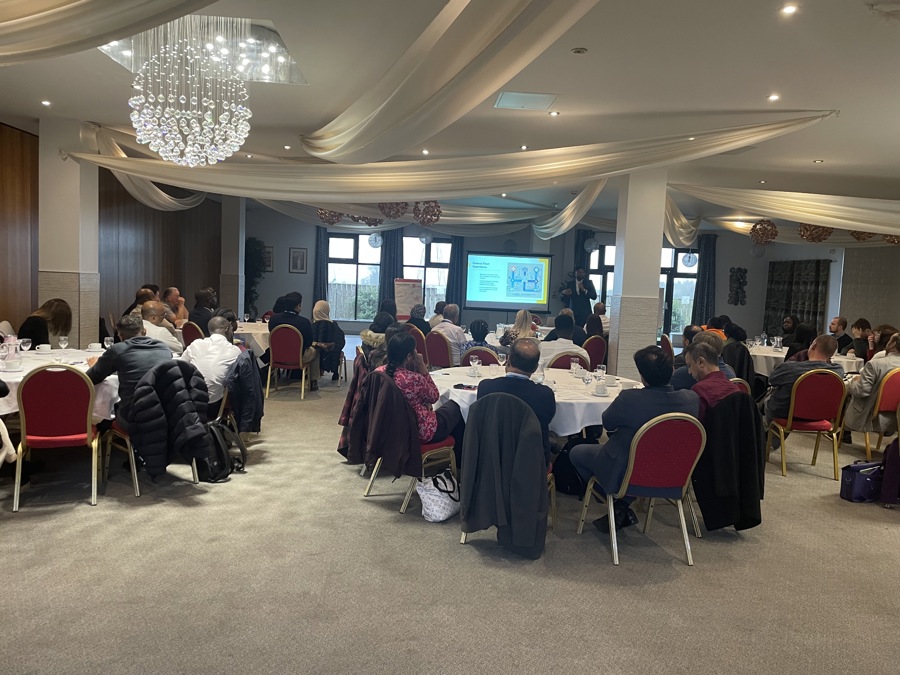Medical Education Conference 2024: Key Insights and International Medical Graduate (IMG) Learning & Support Forum
Published: 15 November 2024

In October 2024, the Medical Education team hosted a dynamic learning and development conference to support International Medical Graduates (IMGs), Resident doctor, SAS, and Consultants within the Trust. The event offered participants not only the chance to enhance their professional skills but also to engage with colleagues in a supportive setting.
The event was chaired by Resident Doctors, Dr Claire Roberts and Dr Kayleigh Jones.
Opening Remarks and Celebrations
Dr. Doug Ma, Consultant Psychiatrist, Royal College Tutor, and IMG Champion launched the conference with an opening speech. Dr. Soraya Mayet, Director of Medical Education (DME) also congratulated the team on their recent recognition: in the 2024 GMC National Training Survey, out of 226 Trusts, the GMC NTS 2024 results ranked our Trainer’s 1st in the UK, 1st in England and 1st locally. Dr. Stella Okwukaogu, Resident Doctor and the Trust’s IMG Lead, acknowledged the unique challenges that IMGs face, emphasising the Medical Education team’s commitment to creating meaningful development opportunities. She said, “It had a big impact and was really applicable to us. Not only will we benefit from the knowledge we gained yesterday, but we can also apply it to help our peers in other parts of the UK in times of need. I have talked to my peers at other Trusts, but they don't get the same kind of support that we IMGs do here. We appreciate your efforts to help us succeed.”
Support from the General Medical Council
Rachel Ball, a Regional Liaison Advisor from the GMC, attended to highlight the GMC’s role in supporting IMG doctors. She outlined GMC services for registration, revalidation, and fitness to practice. Ball discussed the recent addition of “kindness” as a key component in the GMC’s Good Medical Practice standards, highlighting how kindness can enhance both professional satisfaction and patient outcomes.
Ball also encouraged attendees to communicate feedback directly to colleagues to foster an open and constructive work environment, suggesting that informal and neutral feedback helps prevent defensive reactions. Building a supportive and proactive culture, she explained, can mitigate potential conflicts before they escalate.
Insights from Resident Doctors
Dr. Daniel Eghabor, a Core Psychiatry Resident Doctor originally from Nigeria, shared his journey of adapting to a new healthcare system in the UK. He discussed the benefits of multidisciplinary team (MDT) collaboration, describing it as one of the most enriching aspects of his experience. MDT work, he noted, allows various professionals to contribute uniquely to patient care, enhancing both individual and team capabilities in complex psychiatric cases.
Dr. Theresa Ugalahi, Resident Doctor in Child and Adolescent Psychiatry, explored the complex topics of race and differential attainment. She emphasised the importance of reverse mentoring, where junior colleagues mentor senior colleagues, especially on issues related to race, helping leaders understand and address such topics meaningfully. Dr. Ugalahi advocated for nonviolent communication, using observation, feelings, needs, and requests to promote empathy and reduce defensive responses.
Reflection and Learning Approaches for IMGs
Dr. Laura Emery, GP & NIHR In Practice Fellow, University of Sheffield, joined online to discuss reflective practice using the Kolb Experiential Learning Cycle, an approach she recommended for IMGs in GP training. She distinguished between reflection “in action” (real-time reflections while working with a patient) and “on action” (retrospective reflections), explaining how these methods can deepen understanding and improve future performance.
Dr. Emery also addressed the concerns around reflections in the wake of the Bawa-Garba case, where a doctor’s reflections were used in a legal case. She advised keeping reflections focused on personal insights and learnings rather than factual recounting to avoid legal risks. Reflective practice, she suggested, can strengthen resilience and self-awareness in clinical settings.
Linguistic Approaches for Effective Patient Communication
Dr. Marion Bowman, International Tutor at Leeds University Dental School, led an interactive session on how language affects patient interactions. She presented techniques like the “OARS” (Open questions, Affirmations, Reflective listening, and Summarising) approach to support patient openness and comfort in consultations. Dr. Bowman explained that clinicians can create a safer space by using empathy and avoiding overly closed questions, allowing patients to express themselves freely.
Conclusion
The 2024 Medical Education Conference underscored the Trust’s commitment to supporting IMG professionals through collaboration, reflection, and enhanced communication. From fostering cultural understanding and empathy to advocating for reflective learning and feedback, the event offered valuable tools to enrich the careers of doctors of all grades working in the Trust and in particular IMG doctors.









